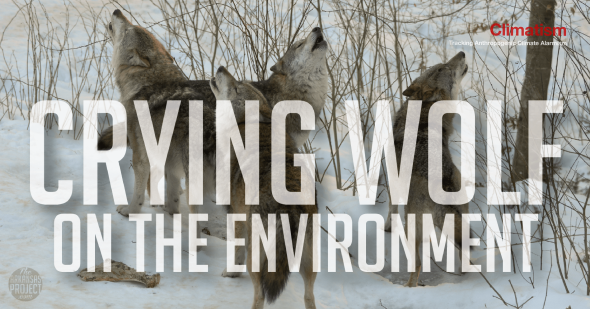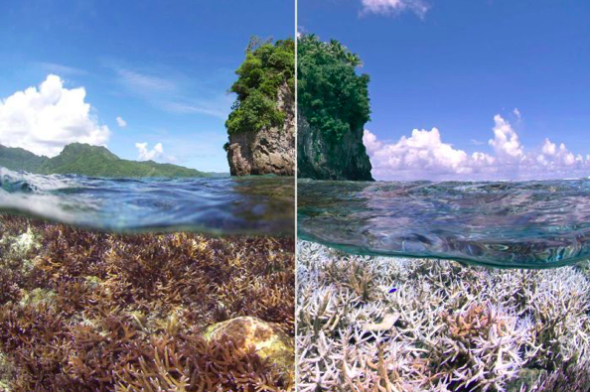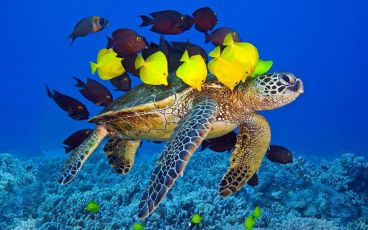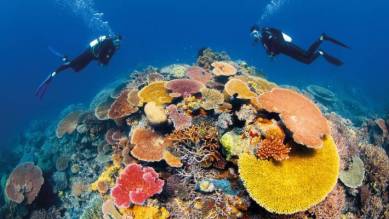GREAT BARRIER REEF SCIENTIST : Coral Can Take The Heat, Unlike ‘Experts’ Crying Wolf
Posted: December 26, 2018 | Author: Jamie Spry | Filed under: Alarmism Debunked, Alarmist media, Alarmists, Climate Alarmism, Climate science, Climatism, Coral Bleaching, Fact Check, Great Barrier Reef, State Of The Climate | Tags: ARC, Climate Change, Climate Change Funding, Climate Change Scam, Climatism, Global Warming, Global Warming Scam, Government Funding, Government grants, Great Barrier Reef, Great Barrier Reef Foundation, Professor Peter Ridd, Queensland, science, Science and Environment, Terry Hughes |1 Comment
Crying Wolf : Great Barrier Reef Alarmism | CLIMATISM
“THE journalists come up and they’re not interested in what the truth is. They’re only interested in finding out where the ‘dead’ reef is. And when people who work right up and down the reef can’t actually take them to a single place that is going to suit their dooms-day story, then we sort of need a bit of balance…”
– Paul Talbott : GBR Tourist operator
***
STRAIGHT-TALKING former James Cook University marine geophysicist Professor Peter Ridd has been an outspoken critic of the relentless tide of fear-mongering, misinformation and anti-science hysteria advanced by climate change activists concerning the health of the Great Barrier Reef.
IN June of 2016, Ridd made the headlines after suspecting something was wrong with photographs being used to highlight the apparent rapid decline of the Great Barrier Reef:

The ABC used a photo of reef bleaching on Flowerpot Rock in American Samoa in stories about the Great Barrier Reef.
AFTER attempting to blow the whistle on the bogus pictures, Ridd was censured and subsequently sacked by James Cook University. (Ridd is currently suing JCU)
After a formal investigation, Professor Ridd was found guilty of “failing to act in a collegial way and in the academic spirit of the institution”!
His crime was to encourage questioning of two of the nation’s leading reef institutions, the Centre of Excellence for Coral Studies and the Great Barrier Reef Marine Park Authority, on whether they knew that photographs they had published and claimed to show long-term collapse of reef health could be misleading and wrong.” Graham Lloyd – The Australian – 11 June 2016
SIMILAR totalitarian treatment was dished out by free-thinking James Cook University to the late and great Bob Carter, a former JCU adjunct Professor. Carter was a world renowned climate change expert and sceptic. His crime – speaking outside the permitted doctrine of global warming climate change.
*
PROFESSOR RIDD writes an ever insightful and eye-opening piece on the reef in today’s Australian.
RIDD comments on the recent backtracking by Scientists from James Cook University who just published a paper on the bleaching and death of corals on the Great Barrier Reef and were surprised that the death rate was less than they expected…
*
Coral can take the heat, unlike experts crying wolf
Scientists from James Cook University have just published a paper on the bleaching and death of corals on the Great Barrier Reef and were surprised that the death rate was less than they expected, because of the adaptability of corals to changing temperatures.
It appears as though they exaggerated their original claims and are quietly backtracking.
To misquote Oscar Wilde, to exaggerate once is a misfortune, to do it twice looks careless, but to do it repeatedly looks like unforgivable systemic unreliability by some of our major science organisations.
The very rapid adaptation of corals to high temperatures is a well-known phenomenon; besides, if you heat corals in a given year, they tend to be less susceptible in the future to overheating. This is why corals are one of the least likely species to be affected by climate change, irrespective of whether you believe the climate is changing by natural fluctuations or because of human influence.
Corals have a unique way of dealing with changing temperature, by changing the microscopic plants that live inside them. These microscopic plants, called zooxanthellae, give the coral energy from the sun through photosynthesis in exchange for a comfortable home inside the coral. When the water gets hot, these little plants effectively become poisonous to the coral and the coral throws them out, which turns the coral white — that is, it bleaches.
But most of the time, the coral will recover from the bleaching. And here’s the trick: the corals take in new zooxanthellae, that floats around in the water quite naturally, and can selectselecting different species that are better suited to hot weather.
Most other organisms have to change their genetic make-up to deal with temperature changes — something that can take many generations. But corals can do it in a few weeks by just changing the plants that live in them.
They have learned a thing or two in a couple of hundred million years of evolution.
The problem here is that the world has been completely misled about the effects of bleaching by scientists who rarely mention the spectacular regrowth that occurs. For example, the 2016 bleaching event supposedly killed 93 per cent, or half, or 30 per cent of the reef, depending on which headline and scientist you want to believe.
However, the scientists looked only at coral in very shallow water — less than 2m below the surface — which is only a small fraction of all the coral, but by far the most susceptible to getting hot in the tropical sun. 
A recent study found that deep-water coral (down to more than 40m) underwent far less bleaching, as one would expect. I estimate that less than 8 per cent of the Barrier Reef coral died. That might still sound like a lot, but considering that there was a 250 per cent increase in coral between 2011 and 2016 for the entire southern zone, an 8 per cent decrease is nothing to worry about. Coral recovers fast.
But this is just the tip of the exaggeration iceberg. Some very eminent scientists claim that bleaching never happened before the 1980s and is entirely a man-made phenomenon. This was always a ridiculous proposition.
A recent study of 400-year-old corals has found that bleaching has always occurred and is no more common now than in the past. Scientists have also claimed that there has been a 15 per cent reduction in the growth rate of corals. However, some colleagues and I demonstrated that there were serious errors in their work and that, if anything, there has been a slight increase in the coral growth rate over the past 100 years.
This is what one would expect in a gently warming climate. Corals grow up to twice as fast in the hotter water of Papua New Guinea and the northern Barrier Reef than in the southern reef. I could quote many more examples.
This unreliability of the science is now a widely accepted scandal in many other areas of study and it has a name: the replication crisis. When checks are made to replicate or confirm scientific results, it is regularly found that about half have flaws. This is an incredible and scandalous situation, a view shared by the editors of eminent journals and many science institutions. A great deal of effort is going into fixing this problem, especially in the biomedical sciences, where it was first recognised.
But not for Barrier Reef science. The science institutions deny there is a problem and fail to correct erroneous work. When Piers Larcombe and I submitted an article to a scientific journal suggesting we needed a little additional checking of Great Barrier Reef science, the response from many very eminent scientists was that there was no need. Everything was fine. I am not sure if this is blind optimism or wilful negligence, but why would anybody object to a little more checking? It would cost only a few million dollars — just a tiny fraction of what governments will be spending on the reef.
But the truth will out eventually. The scare stories about the Barrier Reef started in the 1960s, when scientists first started work on it. They have been crying wolf ever since. But the data keeps coming in and, yes, sometimes a great deal of coral dies in a spectacular manner, with accompanying media fanfare. It is like a bushfire on land — it looks terrible at first, but it quietly and rapidly grows back, ready for the scientists to peddle their story all over again.
Peter Ridd was, until fired this year, a physicist at James Cook University’s marine geophysical laboratory.
Coral can take the heat, unlike experts crying wolf | The Australian
•••
SEE also :
GRB related :
- GREAT BARRIER REEF Hysteria : Exaggerated Claims And Blatant Falsehoods, Designed To Spread Fear And Belief In A Man-Made Climate Apocalypse | Climatism
- THE Great Barrier Reef is thriving, not dying! (local experts / dive-boat operators) | Climatism
- Great Barrier Reef in near pristine condition: dive boat operators | Climatism
- “Dying” Reef Actually Growing | Climatism
- UNESCO ‘Green’ Lights The Reef – Activists Exposed As Liars And Frauds | Climatism
- Not Dead Yet: Great Barrier Reef Coral Cover Up 19 Per Cent In Three Years | Climatism
Professor Ridd :
- Great Barrier Reef Expert : Don’t Trust Climate Alarmists | Climatism
- Science or silence? My battle to question doomsayers about the Great Barrier Reef | Fox News
Flannery GBR and Alarmism related :
- PROFESSIONAL Climate Alarmists Threatening Australia’s Billion Dollar Tourism Industry | Climatism
- CLIMATE Alarmism Has Cost Far More Than Any Global Warming Ever Could | Climatism
- TIM FLANNERY – Professor of Dud Predictions and Climate Falsehoods | Climatism
A GBR Must Read :
- Falling Sea Level: The Critical Factor in 2016 Great Barrier Reef Bleaching! | Climatism (MUST READ)
Great Barrier Reef Scare related :
- THE Great Barrier Reef Lie – Climate Scientists’ Scaremongering Trashed By Mother Nature | Climatism
- Great Barrier Reef Scaremongers Risk 10,000 Jobs | Climatism
- Expert: Scientists exaggerated coral bleaching story | Climatism
- Flannery Plumbs Fresh Depths Of Doom On Australia’s Great Barrier Reef | Climatism
- Climate Change Australia – The Great Barrier Reef Is Dead? What Warmist Writes This Falsehood? | Climatism
- Where’s The Sorry For That Great Barrier Reef Scare? | Climatism
- climate science: MARINE SCIENTIST CENSURED FOR QUESTIONING MISLEADING CLAIMS BY COLLEAGUE
STATE Of The Climate (August 2018) :
IPCC Report 2018 SR15 :
TEMPERATURE Related :
- GLOBAL Temperature Drops By 0.4°C In Three Years | Climatism
- THE Great Global Warming “Pause” | Climatism
- PEER-REVIEWED SCIENCE : The Medieval Warm Period Was Indeed Global And Warmer Than Today | Climatism
ORIGINS Of The Global Warming Scam :
- DRACONIAN UN CLIMATE AGENDA EXPOSED : ‘Global Warming Fears Are A Tool For Political and Economic Change…It Has Nothing To Do With The Actual Climate’ | Climatism
- FATHER Of The 2°C Climate Target Admits Number Is Fabricated : ‘Two degrees is not a magical limit; it’s clearly a political goal’ | Climatism
- THE Orwellian Era Of @NASA Climate Pseudoscience | Climatism
- WESTERN Nations, Driven By A Global Agenda Of Climate Alarmism, Are Destroying Their Industries With Carbon Taxes And Promotion Of Expensive, Intermittent Green Energy | Climatism
- TOMORROW’S Grim, Global, Green Dictatorship | Climatism
- CLIMATE CHANGE – The Most Massive Scientific Fraud In Human History | Climatism
- “In Searching For A New Enemy To Unite Us, We Came Up With The Threat Of Global Warming” | Climatism
- The Creator, Fabricator And Proponent Of Global Warming – Maurice Strong | Climatism
- Global Warming Is The Greatest And Most Successful Pseudoscientific Fraud In History | Climatism
- Sustainability is Malthusianism for the 21st Century | Climatism
- THE Climate Change Farce Explained By Two Expert “Scientists” | Climatism
- UN IPCC : Climate “Has Almost Nothing To Do With Environmental Policy.” | Climatism
- UN IPCC : “Long-Term Prediction of Future Climate States Is Not Possible.” | Climatism
- UN IPCC Rewrote Temperature History To Suit Their Political Agenda | Climatism
- YES! The Climate Changes | Climatism
- OUR Planet Has Enjoyed 10 Warm Periods During The Past 10,000 Years | Climatism
- THE ARCTIC : Ground Zero For Anthropogenic Hubris And Climate Change Hysteria | Climatism
•••
THE Climatism Tip Jar – Help Keep The Good Fight Alive!
(Climate sceptics/rationalists still waitin’ for that “big oil” cheque to arrive in the mail!)
Help us to hit back against the bombardment of climate lies costing our communities, economies and livelihoods far, far too much.
Thanks to all those who have donated and continue on a monthly cycle! Your support and faith in Climatism is highly motivating and greatly appreciated!
Citizen journalists can’t rely on mastheads, rather private donations and honest content. Every pledge helps!
Click link for more info…TQ! Jamie.

•••
One Comment on “GREAT BARRIER REEF SCIENTIST : Coral Can Take The Heat, Unlike ‘Experts’ Crying Wolf”
Leave a Reply Cancel reply
This site uses Akismet to reduce spam. Learn how your comment data is processed.


Reblogged this on Climate- Science.
LikeLiked by 1 person